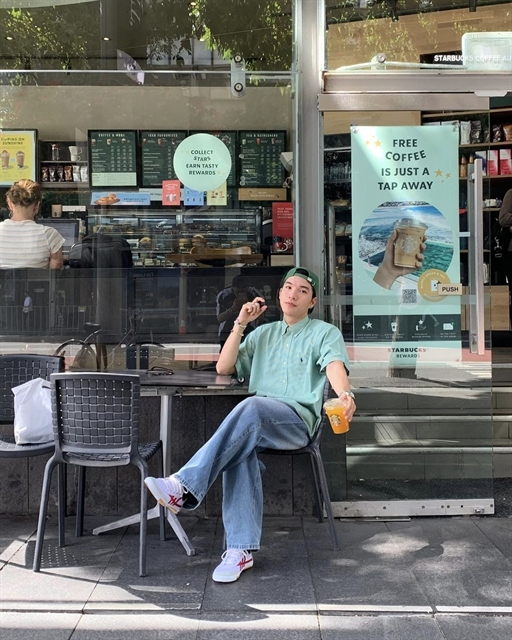 Business Beat
Business Beat


|
| Photo of singer HIEUTHUHAI wearing a pair of red and white striped canvas shoes made by Asia Sports on his Facebook page. Photo Facebook HIEUTHUHAI |
Compiled by Mai Hương
The fashion industry has always seen trends come and go, but the recent fever and subsequent decline of two Vietnamese shoe brands have prompted an inquiry: Will Vietnamese brands be able to capitalise on the trends and opportunities that emerge on social media?
In early March, Thượng Đình and Asia Sports shoes saw a sudden surge in popularity on e-commerce platforms and TikTok with their canvas shoes becoming highly sought after by young consumers.
The trend was initiated by singer HIEUTHUHAI, who posted a photo of himself wearing a pair of red and white striped canvas shoes made by Asia Sports. These shoes bear a resemblance to Thượng Đình’s ASN shoes. The post went viral and was shared by many TikTokers and other influential figures on social media, leading to a surge in demand for the shoes that quickly sold out on e-commerce platforms.
According to some fashion designers, there is a resurgence of nostalgia-inspired fashion accessories from the 2000s and earlier, particularly those from the 1970s and 1980s. This trend has made old-fashion items from domestic brands very popular among Gen Z consumers, born between late 1990s and early 2000s, who may associate these products with their grandparents or parents. This trend is further fueled by influential figures on social media platforms like TikTok, who help promote and popularise local brands such as Thượng Đình.
Fast and responsive?
Việt Nam exports more than one billion pairs of shoes every year, with the majority being produced for international brands. Some domestic brands which hold a notable share in the local market include mid-range brands such as Biti’s, Bita’s, Ananas, RieNevan, Dincox and Juno. Additionally, Thượng Đình and Asia Sports have gained recognition for their affordable, durable shoes in the low-priced segment.
Established in 1957 as a military service facility under the Military Supplies Department, Thượng Đình specialised in the production of rubber hats and sandals in Hà Nam Province. It was officially named Thượng Đình Footwear Co in 1993. Since then, Thượng Đình’s canvas shoes and sport shoes have become familiar among Vietnamese consumers.
However, in the wake of Việt Nam’s economic reform and international integration, this brand quickly became outdated in the face of modern, youthful and stylish designs from foreign brands such as Converse, Vans, Nike, Adidas and more.
Despite the passage of many years, Thượng Đình has retained its original “outdated” design and seen its business shrink. According to its financial statement for 2021, the company reported a pre-tax loss of more than VNĐ770 million (US$32,630) – its fifth consecutive year of recording losses. Though this was a significant improvement compared to losses of tens of billions Vietnamese đồng during 2019-2010, the accumulated loss reached VNĐ49.4 billion, which accounts for over half of the company’s charter capital of VNĐ93 billion.
Many people have been looking forward to the revival of Thượng Đình after the March fever but the brand remained inactive and made no public statements or launched promotion campaigns for their products while Asia Sports has no fan page. Consequently, this trend only remained popular for a few weeks and sales on e-commerce platforms returned to poor results despite high stocks. Young people have moved on to seek out and follow new trends.
However, Thượng Đình is not the only Vietnamese brand that is remembered from the “glorious era” of the past. Several brands such as Chương Dương Sarsi, Thống Nhất matches, Thống Nhất bicycles, Dạ Lan toothpaste, Huda beer, Mỹ Hảo dishwashing liquid and Miliket instant noodle are either struggling with shrinking profits and market shares or being acquired by foreign enterprises.
Biti's provides a great example of capitalising on the influence of key opinion leaders (KOLs) and celebrities to create a successful brand.
Since the late 1990s, Biti's has been well-known for their slogan "Taking care of Vietnamese feet", which has become deeply ingrained in consumers' minds. In 2016-2017, Biti's media campaign "Đi để trở về" (or Going far to Return) created a consumer frenzy in the domestic shoe market, especially after the "Đi để trở về" MV by Soobin Hoàng Sơn and “Lạc Trôi” MV by Sơn Tùng MTP went viral on social media.
In January 2018, the AFC U23 Championship final match in Changzhou, China, amid snowfall had a significant impact. Although the Vietnamese team lost, their courage in the face of the physically stronger Uzbekistan team garnered attention. Subsequently, fans rushed to buy all the red-brown-and-white-dot Hunter shoes that Biti's released.
According to Hùng Võ, the former Chief Marketing Officer (CMO) of Biti's: "Our brand awareness reached its peak at this point."
Biti's has managed to maintain its reputation for quality and affordability since then. However, this has not helped the brand gain a larger market share in the high-end sports or running shoe market, where it competes with global giants like Nike, Adidas and Decathlon.
Sam Nguyễn, a representative from Geo Consulting Vietnam, which is the exclusive distributor of BTS souvenirs in Việt Nam, said that Vietnamese brands often fail to sustain long-term growth in the emotional product sector.
“To succeed, brands must be prepared to ride multiple waves of consumer demand and have a plan for the next wave,” Sam was quoted as saying on thesaigontimes.vn.
Some experts have noted that Vietnamese brands typically have a lifespan of no more than 30 years. However, this only holds true for companies that fail to adapt to economic innovation, international integration and new trends in finance, governance, and creativity. Not all companies fall into this category. For example, Vinamilk has been a leading food product brand for nearly 50 years, while Biti's has maintained a steady presence in the footwear manufacturing industry for over 40 years.
Key factors for sustainable development of Vietnamese enterprises include leadership, R&D investment, corporate culture, technology, productivity, and IP management. — VNS




